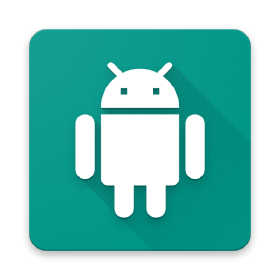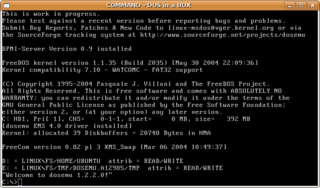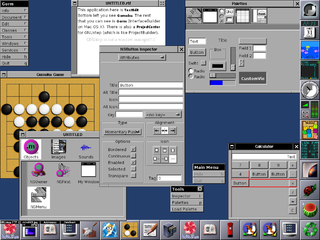 W
WAnbox is a free and open-source compatibility layer that aims to allow mobile applications and mobile games developed for Android to run on GNU/Linux distributions. Canonical introduced Anbox Cloud, for running Android applications in a cloud environment.
 W
WConEmu is a free and open-source tabbed terminal emulator for Windows. ConEmu presents multiple consoles and simple GUI applications as one customizable GUI window with tabs and a status bar. It also provides emulation for ANSI escape codes for color, bypassing the capabilities of the standard Windows Console Host to provide 256 and 24-bit color in Windows.
 W
WCygwin is a POSIX-compatible programming and runtime environment that runs natively on Microsoft Windows. Under Cygwin, source code designed for Unix-like operating systems may be compiled and run natively with minimal modification.
 W
WDarling is a free and open-source macOS compatibility layer for GNU/Linux. It duplicates functions of macOS by providing alternative implementations of the libraries and frameworks that macOS programs call. This method of duplication differs from other methods that might also be considered emulation, where macOS programs run in a virtual machine. Darling has been called the counterpart to WINE for running OS X apps.
 W
WDOSEMU, stylized as dosemu, is a compatibility layer software package that enables DOS operating systems and application software to run atop Linux on x86-based PCs.
 W
WExecutor is a software application that allows Motorola 68000-based classic Mac OS programs to be run on various x86-based operating systems. Executor was created by ARDI. As of 2005, Executor development has been indefinitely postponed; as of 2008, it was made available as open source software.
 W
WGNUstep is a free software implementation of the Cocoa Objective-C frameworks, widget toolkit, and application development tools for Unix-like operating systems and Microsoft Windows. It is part of the GNU Project.
 W
WHybris or libhybris is a compatibility layer for computers running Linux distributions based on the GNU C library or Musl, intended for using software written for Bionic-based Linux systems, which mainly includes Android libraries and device drivers.
 W
WFreeBSD is a free and open-source Unix-like operating system descended from the Berkeley Software Distribution (BSD), which was based on Research Unix. The first version of FreeBSD was released in 1993. In 2005, FreeBSD was the most popular open-source BSD operating system, accounting for more than three-quarters of all installed simply, permissively licensed BSD systems.
 W
WNDISwrapper is a free software driver wrapper that enables the use of Windows XP network device drivers on Linux operating systems. NDISwrapper works by implementing the Windows kernel and NDIS APIs and dynamically linking Windows network drivers to this implementation. As a result, it only works on systems based on the instruction set architectures supported by Windows, namely IA-32 and x86-64.
 W
WPlayOnMac is a free compatibility layer for macOS that allows installation and use of video games and apps designed to run on Microsoft Windows. PlayOnMac is based on the open-source Wine project.
 W
WIn computer programming, a shim is a library that transparently intercepts API calls and changes the arguments passed, handles the operation itself or redirects the operation elsewhere. Shims can be used to support an old API in a newer environment, or a new API in an older environment. Shims can also be used for running programs on different software platforms than they were developed for.
 W
WUserLAnd Technologies is a free and open-source ad-free compatibility layer mobile app that allows Linux distributions, computer programs, computer games and numerical computing programs to run on mobile devices without requiring a root account. UserLAnd also provides a program library of popular free and open-source Linux-based programs to which additional programs and different versions of programs can be added.
 W
WWindows Subsystem for Linux (WSL) is a compatibility layer for running Linux binary executables natively on Windows 10 and Windows Server 2019.
 W
WWine is a free and open-source compatibility layer that aims to allow application software and computer games developed for Microsoft Windows to run on Unix-like operating systems. Wine also provides a software library, known as "Winelib", against which developers can compile Windows applications to help port them to Unix-like systems.